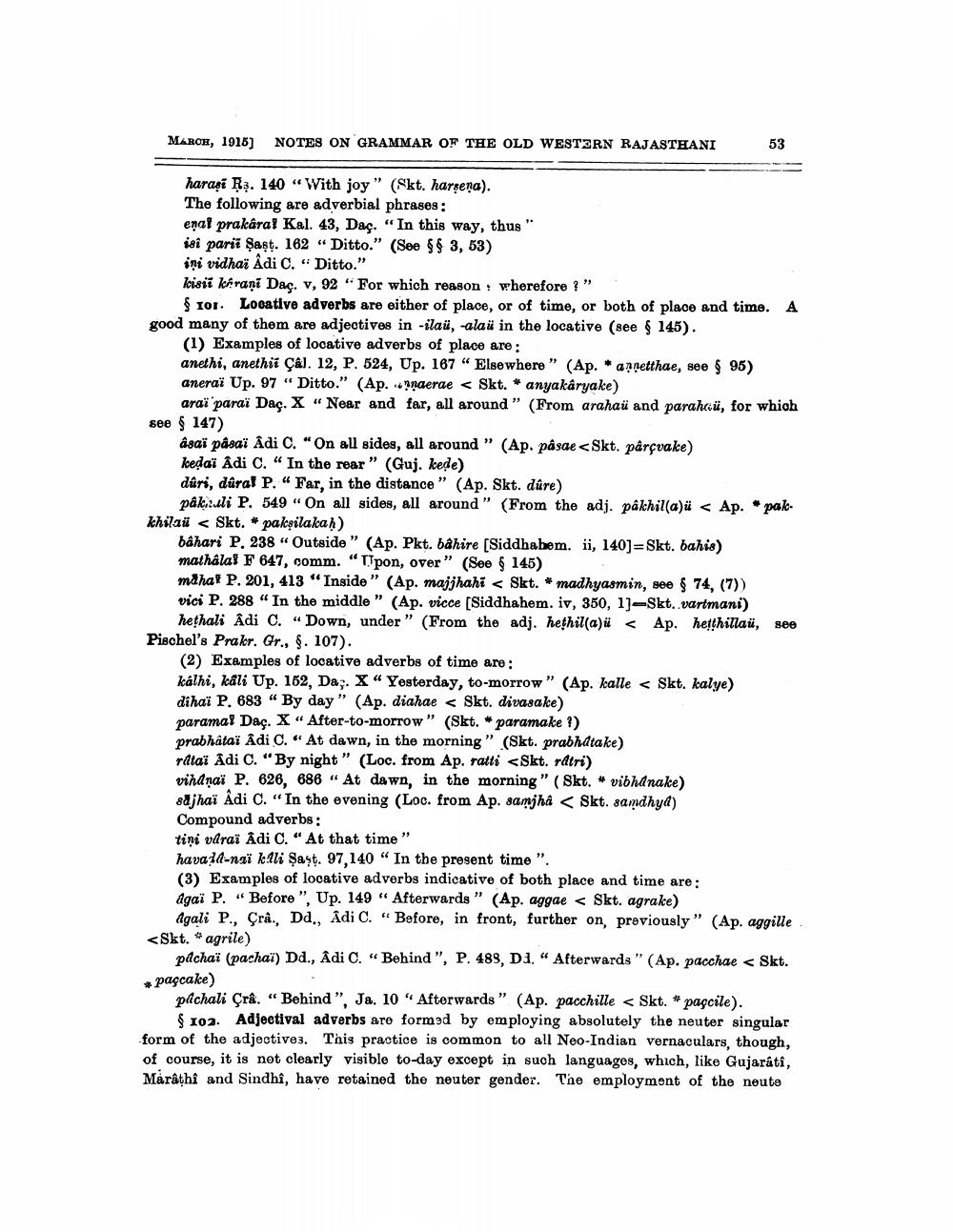________________
MARCH, 1915]
NOTES ON GRAMMAR OF THE OLD WESTERN RAJASTHANI
harasi Rs. 140 "With joy" (Skt. harsena).
The following are adverbial phrases:
enal prakâral Kal. 43, Daç. "In this way, thus "
isi parii Șast. 162 "Ditto." (See §§ 3, 53)
ini vidhai Adi C. Ditto."
53
kisii kerani Daç. v, 92 "For which reason wherefore?"
:
§ 101. Locative adverbs are either of place, or of time, or both of place and time. A good many of them are adjectives in -ilau, -alau in the locative (see § 145).
(1) Examples of locative adverbs of place are:
anethi, anethii Çâl. 12, P. 524, Up. 167 "Elsewhere" (Ap. * annetthae, see § 95)
aneraï Up. 97" Ditto." (Ap. araï paraï Daç. X "Near and see § 147)
âsaï påsaï Adi C. "On all sides, all around" (Ap. pâsae <Skt. pârçvake)
kedai Adi C. "In the rear" (Guj. kede)
naerae < Skt. * anyakâryake)
far, all around" (From arahau and parahcü, for which
dûri, dûral P. "Far, in the distance" (Ap. Skt. dûre)
pakuli P. 549 "On all sides, all around" (From the adj. pâkhil(a)ü < Ap. * pak. khilai Skt. * paksilakaḥ)
bahari P. 238 "Outside" (Ap. Pkt. bâhire [Siddhabem. ii, 140]=Skt. bahis) mathalal F 647, comm. "Tpon, over" (See § 145)
mahat P. 201, 413 "Inside" (Ap. majjhahi Skt. * madhyasmin, see § 74, (7)) vici P. 288 "In the middle" (Ap. vicce [Siddhahem. iv, 350, 1]-Skt. vartmani) hethali Adi C. " Down, under" (From the adj. hethil(a)ü< Ap. hetthillai, see Pischel's Prakr. Gr., §. 107).
(2) Examples of locative adverbs of time are:
kálhi, kali Up. 152, Da;. X " Yesterday, to-morrow" (Ap. kalle < Skt. kalye)
dihaï P. 683 "By day" (Ap. diahae < Skt. divasake)
parama? Daç. X" After-to-morrow" (Skt. * paramake?) prabhâtai Adi C. "At dawn, in the morning" (Skt. prabhatake) rataï Adi C. "By night" (Loc. from Ap. ratti <Skt. råtri)
vihanai P. 626, 686 "At dawn, in the morning" (Skt. * vibhanake) sajhai Adi C. "In the evening (Loc. from Ap. samjha < Skt. sandhya) Compound adverbs:
tiņi varai Adi C. "At that time"
havad-naï kili Şast. 97,140 "In the present time ".
(3) Examples of locative adverbs indicative of both place and time are:
agaï P. "Before", Up. 149 " Afterwards" (Ap. aggae < Skt. agrake)
agali P., Crâ., Dd,, Adi C. "Before, in front, further on, previously" (Ap. aggille <Skt. agrile)
pachai (pachai) Dd., Adi C. "Behind", P. 488, D3. "Afterwards" (Ap. pacchae < Skt. pagcake)
pachali Crâ. "Behind", Ja. 10" Afterwards" (Ap. pacchille < Skt. * paçcile).
§ 102. Adjectival adverbs are formed by employing absolutely the neuter singular form of the adjectives. This practice is common to all Neo-Indian vernaculars, though, of course, it is not clearly visible to-day except in such languages, which, like Gujarati, Marathi and Sindhi, have retained the neuter gender. The employment of the neute




